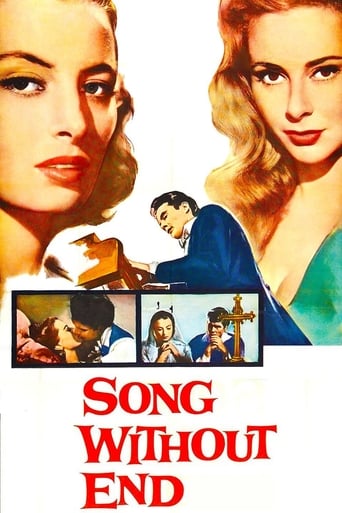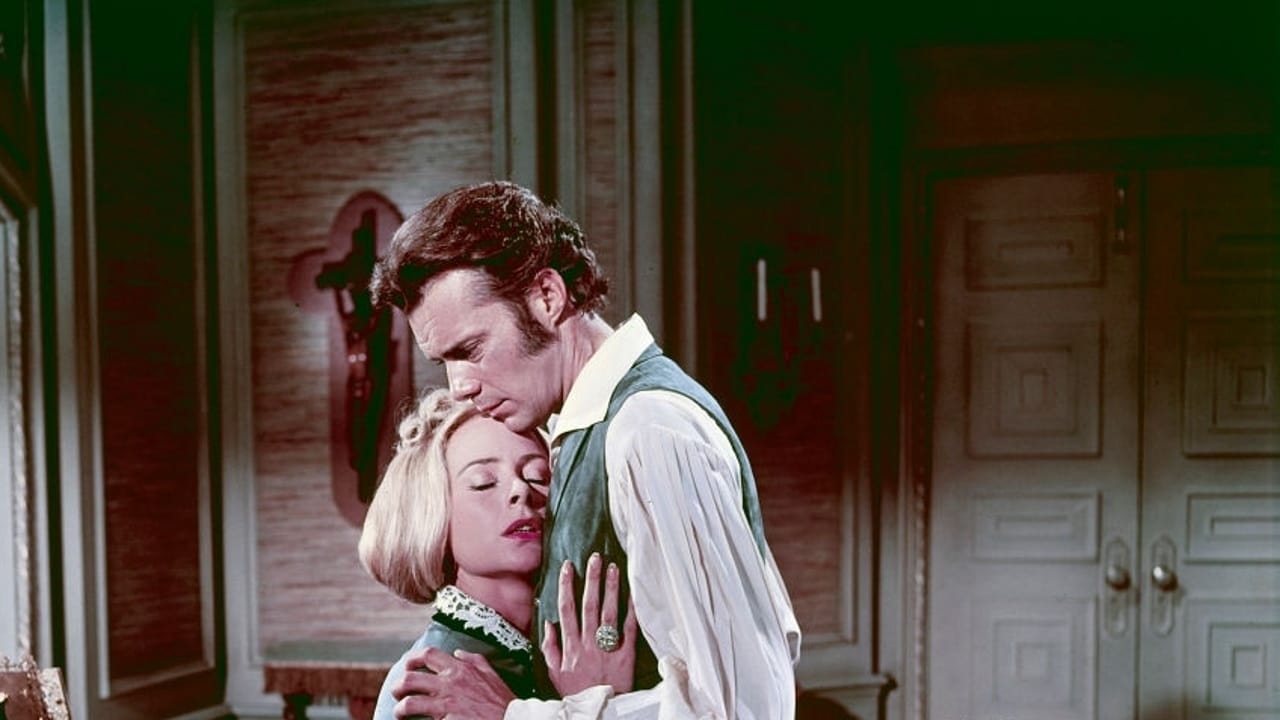Vonia
Song Without End (1960)
Directors: Charles Vidor and George Cukor
Watched: June 13, 2018
Rating: 6/10 Free
Concerts,
Bogarde acts,
Knows piano.
Highly dramatized Franz Liszt portrayal-
Focused on libertine and narcissist,
Rather than his
Better traits;
Hard to
Care;
Meant
To be
Romantic,
Felt feigned instead.
Partial biopic where religion reigns,
But, "Once a cheater, always a cheater!"
Bolet's grand score,
Great costumes
And sets
Save.
----
Tetractys poems stem from the mathematician Euclid, who considered the number series 1, 2, 3, 4 to have a mystical significance because of its sum of 10. He named it a Tetractys. Thus, these poems follow a 1, 2, 3, 4, 10 syllable format, with additional verses written in an inverted syllable count.
#Tetractys #QuadrupleTetractys #PoemReview #GoldenGlobesBestPicture #Musical
TheLittleSongbird
While it may take time to warm to Liszt, if at all (personally this reviewer loves his music, if more when at an older age than younger), one cannot deny how influential he was as a composer and especially as a performer (he was incredibly important in his lifetime).'Song Without End' is certainly much better than Ken Russell's 'Lisztomania', a very hard to rate film that was visually striking but ruined by gratuitous excess and lack of taste, and does have many pleasures but biographically it disappoints. It is a visually sumptuous film for starters, it's very beautifully photographed, the costumes are lavish, richly colourful and true to period and the settings, interiors and scenery are gorgeous to watch. The music is definitely the highlight of 'Song Without End', whether it is bombastic and energetic like the second 'Hungarian Rhapsody' or intimate and poignant like the third 'Liebestraume', and it's all cleverly arranged. Contrary to one reviewer the inclusion of music of other composers was quite nice though there could have been a little more of Liszt's, 'Totentanz' would have been absolutely thrilling to listen to. One mustn't forget the magnificent playing of Jorge Bolet, absolutely agree that it is some of the best-performed classical music in film. Liszt's music is fiendishly and notoriously difficult for a pianist ('Totentanz' for example is hard enough with piano and orchestra, in solo piano version it's a killer), but Bolet , with such energetic, hugely musical and poetic playing, makes it sound effortless. 'Song Without End' is nicely directed, and never resorts to vulgarity or excess. While its representation of Liszt is not exactly a faithful one (one doesn't find it easy to believe him as that much of a womaniser, almost too much on the slightly sleazy side, and especially as a prima donna), it is not the literal character assassination of 'Lisztomania', because it also gets some things right like he was a man of great charity, was highly noble and women were attracted to him). 'Song Without End' is also not without its powerful and affecting moments, and the music plays an enormous part in why that is, the fact that Liszt played the music of other composers as well and that he was a fan of Chopin is incorporated remarkably intelligently.The cast are very good. Whether one takes issue with how Liszt is portrayed, it cannot be blamed at Dirk Bogarde's door but how he's written. Bogarde does an excellent job, and is very believable and charismatic whether amorous or more intense in the context of how Liszt is written and as a performance in general. Genevieve Page and especially Capucine are breathtakingly beautiful, and Page also plays the film's most sympathetic character very poignantly. Martita Hunt is also memorable, Hunt as is evidenced by her definitive Miss Havisham in David Lean's classic 'Great Expectations' had a knack for stealing scenes regardless of the size of the role. Bogarde and Capucine and particularly Bogarde and Page also convince together, quite touching in fact at times.For all its many good things, 'Song Without End' is not without its flaws. There is an exception to the high standard set by the cast, and that is agreed the miscast and out of place Lou Jacobi, whose appearance and the way he spoke being somewhat anachronistic and jarring. The film does drag in places, getting bogged down by a few strands like the greatly and too obviously romanticized romances (that are also factually distorted, the film fails to mention the Countess' emotional problems before meeting Liszt and how big a part it played in their break up). The story here is compelling but some things that were included could have been elaborated on in more detail. While there are some things that are faithful- like his devotion for art- it is every bit as easy to spot the inaccuracies and anachronisms, like the notion of Liszt feeling inferior to Chopin with the existence of his 'Transcendental Etudes' being long before he even met Chopin . It does focus too much on the romantic side of his character and not enough on his magnetic way of performing he held that earned him the admiration of several other fellow performers (it does focus on a small portion of his life and unfortunately it is not the most compelling or the most telling of Liszt's character). Lastly, some of the script is flimsy with some soap-opera-like dialogue and areas that were potentially interesting but lack depth.All in all, disappointing in some areas but also a film of many pleasures. 6/10 Bethany Cox
vmcgnv
Saw this in the movies when it came out (1960) when I was 21 and was transported. Seen it again a few times since then and it holds it's power for me. Of course the magic is the music, played never better by Jorge Bolet. Wasn't that knowledgeable about Liszt prior but became an instant fan after seeing it. The settings, dress, acoustics, and color also make it an outstanding 2 hours well spent. The story is not that important since it's the music you're waiting for. All hands did well, and especially Bogarde with his spot-on finger-work. However, how anyone would expect such raving beauties to be swooning over the likes of the foppish, prancing queen portrayed here by good old Dirk is a mystery to me. Were it not for the majestic music this wouldn't be worth a second look...but oh that music.
JBall75487
In a confused welter of artistic licence, this is the classical music biopic which makes 'Song to Remember'look like a masterpiece. Bogarde succeeds in diminishing the reputation of the musical colossus who spanned European music for most of the 19th Century. The absurdities of the plot, the sequoia-like quality of the acting and the prevalence of historical,musical and linguistic anachronisms combine to elevate this offering to the status of an A1 turkey.How a pianist of the stature of Bolet came to be mixed up in this fiasco can only be guessed at. The characterisation of Liszt fails to convey even a minute impression of his magnetic personality and the overwhelming effect that he had on not only his audiences, but also his pianistic rivals.Clara Schumann herself said that 'we toil over that which Liszt reads at sight!' Whilst the emphasis seems to focus on his romantic prowess,rather than his status as the greatest pianist of the century or,arguably, of all time, one feels,nevertheless, that this was an opportunity lost.



 AD
AD


